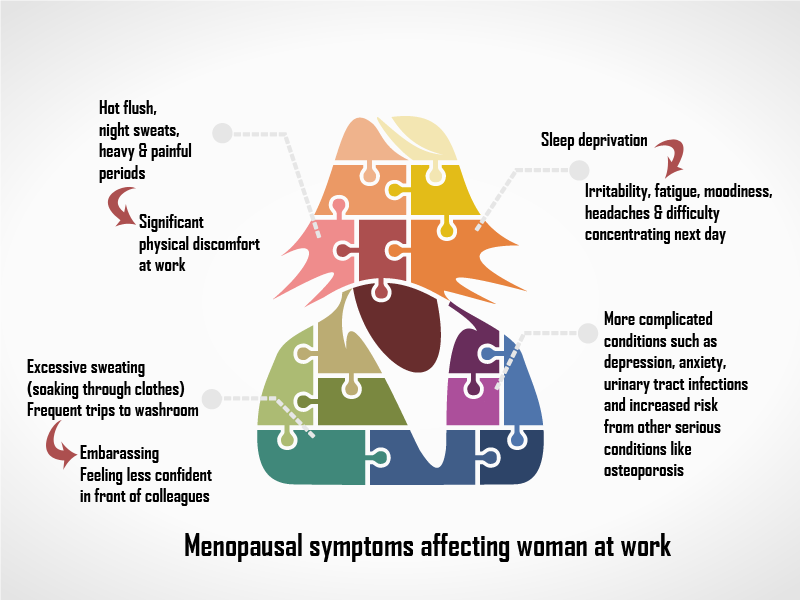Menopause is a part of the ageing process and will affect every woman at some point in their life. We are in a world where women are working longer. Looking at the age range, the time when menopause affects women in their lives and providing that it may last for few years (average four years), many women may go through menopause while they are still working.
Women at or approaching the menopause, those who have had a premature menopause (before the age of 40) or a hysterectomy fall into the group of females who often have difficulties dealing with menopause while working.
Symptoms can vary amongst individuals affected but main symptoms include hot flushes, night sweats, heavy and painful periods and related symptoms such as sleep disruption. Sleep deprivation can lead to irritability, fatigue, moodiness, headaches and difficulty concentrating next day. This can be problematic when you are dealing with customers and in stressful situations. Severe flushes can sometimes cause sweat to soak through clothing. All these symptoms pose significant and embarrassing problems for some women, leaving them feeling less confident. These symptoms can affect the quality of both personal and working life for women.
Work conditions like poor ventilation, high-temperature work environment or the bathroom too far away can make symptoms worse and aggravate menopause-related discomfort. Other conditions linked to the menopause include heart palpitations, cystitis/urinary tract infections and even increased the risk of other, more serious conditions such as osteoporosis. These symptoms can begin 2 to 7 years before the menopause, during the transitional time known as peri-menopause, when production of the female hormones, estrogen and progesterone, decrease. It is obviously not much fun while you go through these symptoms in the background and thus it can make your normal routine tasks much harder work to do.
Employers have responsibilities for the health and safety of all their employees, hence there is a good reason to consider the needs of this group of workers. Most of the organisations do not have clear processes to support women at this stage of life compared to while being pregnant or having other medical conditions. Regular, informal conversations between manager and employee may enable discussion of changes in health. It may be valuable simply to acknowledge that menopause is a normal stage of life and that adjustments can be easily made. Such conversations can identify support at work that can help women.
However, employers need to recognise that the majority of women are unwilling to disclose menopause-related health problems to their managers, especially when they are men and younger than them and struggle to cope with their symptoms as this is not a subject that is easily spoken about. This may have to be through human resources, a welfare officer or an occupational health professional.
These are few steps that can be adapted by managers/ employers below:
- Raise awareness to convey the message that the menopause can present difficulties for some women at work.
- Review control of workplace temperature and ventilation.
- Provision of a desk fan in an office, or locating a workstation near an opening window or away from a heat source.
- If sleep is disturbed, later start times might be helpful. Consider flexible working hours or shift changes.
- Provide access to cold drinking water in all work situations, including off-site venues.
- Ensure access to washroom facilities and toilets, including when travelling or working in temporary locations.
- Restroom access is important because menopausal women are more susceptible to bladder infections and/or urinary incontinence during menopause.
- Where uniforms are compulsory, a flexibility of including the use of thermally comfortable fabrics or avoiding the use of synthetic materials like nylon, optional layers and the provision of change room will be helpful.
- In customer-focused or public facing roles, it may help to have access to a quiet room for a short break so as to manage a severe hot flush.
What women can do to manage their menopausal symptoms at work:
- Seek your GP’s advice on available treatment options.
- Discuss your practical needs with your manager or HR.
- Use technology to organise and manage your tasks better, e.g. use reminders or note taking.
- If there is an occupational health service available, discuss possible work adjustments and resources which can be helpful.
- If those you work with are supportive, this can make a big difference. Talk about your symptoms and solutions with colleagues, particularly those who are also experiencing symptoms, use humour to deflect embarrassment, and work out your preferred coping strategies and working patterns.
- Avoid hot flush triggers (such as hot food and drinks) especially before presentations or meetings.
- Relaxation techniques such as mindfulness and other potentially helpful techniques such as cognitive behavioural therapy can help reduce the impact of symptoms.
- Consider lifestyle changes such as weight reduction, smoking cessation and exercise.
The menopause has been regarded as a taboo subject. But this is changing as employers gradually acknowledge the potential impact of the menopause on women and become aware of the simple steps they can take to be supportive.
References
- Annual report of the Chief Medical Officer 2014, Chapter 9, Psychosocial risk factors and the menopause: the impact of the menopause on personal and working life
- http://www.bohrf.org.uk/downloads/Work_and_the_ Menopause-A_Guide_for_Managers.pdf
- https://www.tuc.org.uk/sites/default/files/TUC_ menopause_0.pdf









I just like the valuable information you supply to your articles. I will bookmark your weblog and check again right here frequently. I’m moderately certain I’ll learn a lot of new stuff right right here! Best of luck for the next!